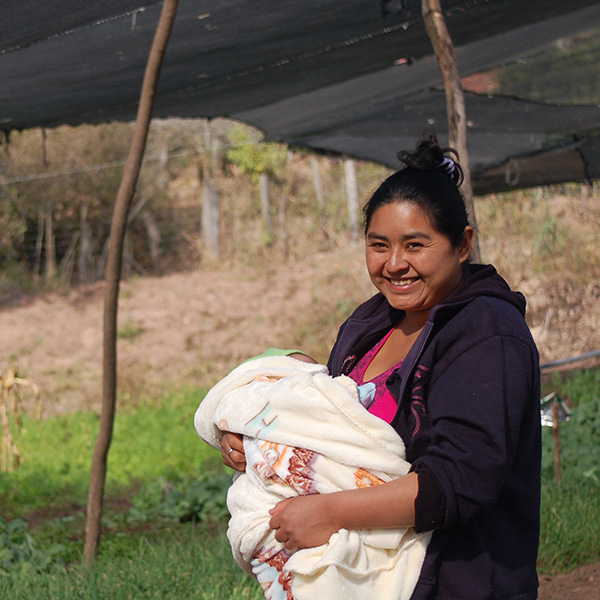Stories of Change

Group member Silvia Bayande in front of the covered garden.
Each woman in this group could earn more than $1,000 each year through flower sales.
Brighter futures blooming in Bolivia
Flowers are an important part of celebrating certain religious holidays in the Chaco region of Bolivia. Families use flowers to decorate crosses or leave them at the graves of loved ones on the Day of the Cross in May and All Saints Day on November 1. This means that there is a high demand for flowers among the roughly 1,500 people who live in the town of Karapari.
The problem is that no one is currently producing flowers for sale in Karapari. Flowers are trucked in from a city four hours away, and that means they are really expensive.
Eight entrepreneurial women in the Guarani indigenous community of Campo Largo, which is about 15 minutes from Karapari, came up with a win-win solution. Led by Maria Luisa Aballende, they contacted our local partner, CERDET, to share their idea in 2017. They wanted to fill the void and produce flowers for sale in Karapari. This would be a way to provide flowers at a more reasonable price to the people of Karapari, and it would extra income for the women and their families. They were already starting to experiment with growing flowers at their homes, just two varieties at a time. They knew they could expand their business, but they needed some support to get going.
With support from CWS and Foods Resource Bank (soon to be Growing Hope Worldwide), CERDET helped the women put their plan into action. Three women went to visit the larger city for two days, where they visited the cemetery and talked to flower and seed producers and vendors. They wanted to know what types of flowers sold the most and conduct other market research.
Back in Campo Largo, CERDET drew on their agricultural expertise to share what they could with the women about ways to make sure their flower garden succeeded. They helped them build a shade structure over their garden, which prevents sun and heat damage to the flowers. They also helped them set up a sprinkler irrigation system and provided seeds for five types of flowers, including lilies, daisies and carnations.
The group successfully sold their first flower harvest in May and is hard at work on their second harvest for All Saints Day. “They are united,” says Ricardo, the CERDET technician who works with the group. “I visited them 10 days ago to plan for the November harvest, and they were very happy and proud of their ability to produce new varieties.”
As word of mouth spreads, the group’s reputation is growing, and customers are starting to place orders well in advance. The group now has a plan to grow 12 types of flowers and earn between $260 and $360 per variety per harvest. That means earning up to $8,640 each year, shared among the eight women!
This group has big plans. “Their vision is to secure a permanent place at the new municipal market in Karapari where they could sell year-round. We are going to support them in the market analysis and conversations with the market authorities,” says Ricardo.
As the group’s prospect and reputation grows, the group itself may grow, too. Other women in Campo Largo have seen the group’s success. Ricardo says, “They want to join the group, so we are going to accompany them as they become bigger.”
CERDET is the Center for Regional Studies of Tarija, a Bolivian organization that promotes the economic empowerment of both indigenous and non-indigenous communities in the Bolivian Chaco. With support from CWS and Foods Resource Bank, CERDET has joined forces with local indigenous organizations to support small income-generating activities of indigenous women and youth in particular.
